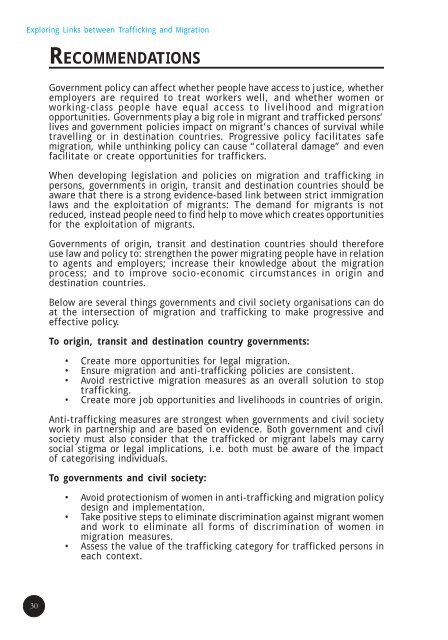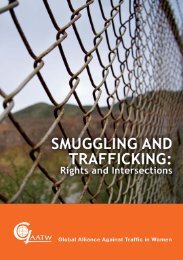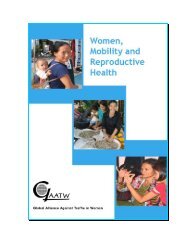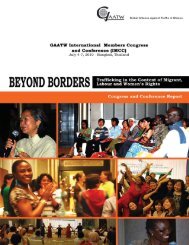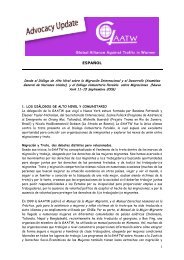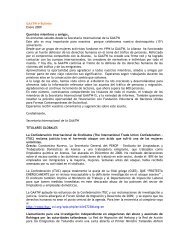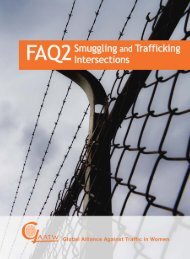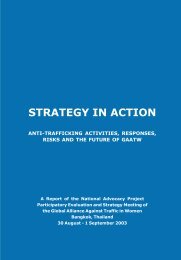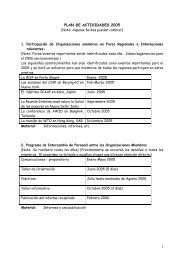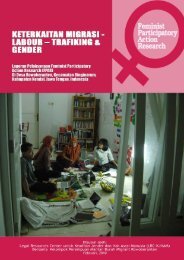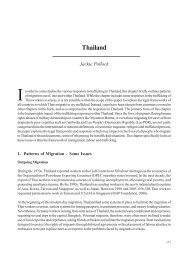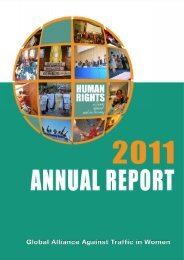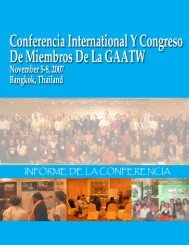<strong>Exploring</strong> <strong>Links</strong> <strong>between</strong> <strong>Trafficking</strong> <strong>and</strong> <strong>Migration</strong>RECOMMENDATIONSGovernment policy can affect whether people have access to justice, whetheremployers are required to treat workers well, <strong>and</strong> whether women orworking-class people have equal access to livelihood <strong>and</strong> migrationopportunities. Governments play a big role in migrant <strong>and</strong> trafficked persons’lives <strong>and</strong> government policies impact on migrant’s chances of survival whiletravelling or in destination countries. Progressive policy facilitates safemigration, while unthinking policy can cause “collateral damage” <strong>and</strong> evenfacilitate or create opportunities for traffickers.When developing legislation <strong>and</strong> policies on migration <strong>and</strong> trafficking inpersons, governments in origin, transit <strong>and</strong> destination countries should beaware that there is a strong evidence-based link <strong>between</strong> strict immigrationlaws <strong>and</strong> the exploitation of migrants: The dem<strong>and</strong> for migrants is notreduced, instead people need to find help to move which creates opportunitiesfor the exploitation of migrants.Governments of origin, transit <strong>and</strong> destination countries should thereforeuse law <strong>and</strong> policy to: strengthen the power migrating people have in relationto agents <strong>and</strong> employers; increase their knowledge about the migrationprocess; <strong>and</strong> to improve socio-economic circumstances in origin <strong>and</strong>destination countries.Below are several things governments <strong>and</strong> civil society organisations can doat the intersection of migration <strong>and</strong> trafficking to make progressive <strong>and</strong>effective policy.To origin, transit <strong>and</strong> destination country governments:• Create more opportunities for legal migration.• Ensure migration <strong>and</strong> anti-trafficking policies are consistent.• Avoid restrictive migration measures as an overall solution to stoptrafficking.• Create more job opportunities <strong>and</strong> livelihoods in countries of origin.Anti-trafficking measures are strongest when governments <strong>and</strong> civil societywork in partnership <strong>and</strong> are based on evidence. Both government <strong>and</strong> civilsociety must also consider that the trafficked or migrant labels may carrysocial stigma or legal implications, i.e. both must be aware of the impactof categorising individuals.To governments <strong>and</strong> civil society:• Avoid protectionism of women in anti-trafficking <strong>and</strong> migration policydesign <strong>and</strong> implementation.• Take positive steps to eliminate discrimination against migrant women<strong>and</strong> work to eliminate all forms of discrimination of women inmigration measures.• Assess the value of the trafficking category for trafficked persons ineach context.30
NOTES AND REFERENCES<strong>Exploring</strong> <strong>Links</strong> <strong>between</strong> <strong>Trafficking</strong> <strong>and</strong> <strong>Migration</strong>1Further explored in GAATW <strong>and</strong> NYU IHRC (2010). Beyond Borders: <strong>Exploring</strong> <strong>Links</strong><strong>between</strong> <strong>Trafficking</strong>, <strong>Global</strong>isation, <strong>and</strong> Security. GAATW Working Paper Series. Bangkok:GAATW.2For more information on the definition, see: United Nations Office on Drugs <strong>and</strong> Crime.What is human trafficking? Retrieved April 23, 2010, from http://www.unodc.org/unodc/en/human-trafficking/what-is-human-trafficking.html3GAATW. (2010). Beyond Borders: <strong>Exploring</strong> <strong>Links</strong> <strong>between</strong> <strong>Trafficking</strong> <strong>and</strong> Labour. GAATWWorking Paper Series. Bangkok: GAATW. From GAATW’s observation, many anti-traffickingmeasures <strong>and</strong> programmes prioritise the movement phase. However, from discussionswith trafficked persons <strong>and</strong> GAATW members, trafficked persons are often most mostconcerned about the exploitation they experienced.4For more information, see GAATW. (2009). Blurry Cases. <strong>Alliance</strong> News, 32. Bangkok:GAATW. Available online at http://www.gaatw.org/index.php?option=com_content&view=category&layout=blog&id=10&Itemid=205In the 1951 UN Convention Relating to the Status of Refugees, a refugee is ‘a personwho, owing to a well-founded fear of being persecuted on account of race, religion,nationality, membership of a particular social group, or political opinion, is outside thecountry of their nationality, <strong>and</strong> is unable to or, owing to such fear, is unwilling to availhim/herself of the protection of that country.’6In the 2000 UNTOC Smuggling Protocol, smuggling is ‘the procurement, in order toobtain, directly or indirectly, a financial or other material benefit, of the illegal entryof a person into a State Party of which the person is not a national or a permanentresident.’7The 2000 UNTOC Human <strong>Trafficking</strong> Protocol defines trafficking in persons as ‘therecruitment, transportation, transfer, harbouring or receipt of persons, by means ofthe threat or use of force or other forms of coercion, of abduction, of fraud, ofdeception, of the abuse of power or of a position of vulnerability or of the giving orreceiving of payments or benefits to achieve the consent of a person having controlover another person, for the purpose of exploitation.’8Speech from Jyoti Sanghera, Dep representative of OHCHR in Nepal. (2010, March 14).GAATW Roundtable III: Bringing together ‘Linkages’ topics: in Feminist ParticipatoryAction Research <strong>and</strong> GAATW Working Papers, Bangkok, 10-14 March 2010.9GAATW. (2010). Beyond Borders: <strong>Exploring</strong> <strong>Links</strong> <strong>between</strong> <strong>Trafficking</strong> <strong>and</strong> Labour. GAATWWorking Paper Series. Bangkok: GAATW.10O’Neill, B. (2006, April 21). Rebr<strong>and</strong>ing Immigration. Guardian. Retrieved online athttp://commentisfree.guardian.co.uk/brendan_oneill/2006/04/rebr<strong>and</strong>ing_immigrationn_as_traf.html11GAATW. (2010). Beyond Borders: <strong>Exploring</strong> <strong>Links</strong> <strong>between</strong> <strong>Trafficking</strong> <strong>and</strong> Gender. GAATWWorking Paper Series. Bangkok: GAATW.12Save the Children UK. (2007). Children on the Move. Retrieved online at http://www.savethechildren.org.uk/en/54_3866.htm13See for instance Marriage <strong>Migration</strong> in Asia. ARENA. http://arenaonline.org/xe/?document_srl=1871&mid=mmia_info14In GAATW (Ed.). (2007). Collateral Damage: The Impact of Anti-<strong>Trafficking</strong> Measures onHuman Rights Around the World. Bangkok, Thail<strong>and</strong>: GAATW.15Self-Empowerment Program for Migrant Women (SEPOM). (2010). ‘Trafficked’ Identitiesas a Barrier to Community Reintegration: Five Stories of Women Rebuilding Lives <strong>and</strong>Resisting Categorisation. GAATW Feminist Participatory Action Research Series. Bangkok:GAATW.31


